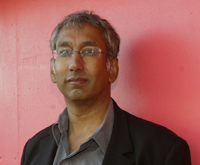Kenan Malik, der immer wieder klarsichtige Analytiker des britischen Multikulturalismus, hat nach 20 Jahren aufgeschrieben, wie die Rushdie-Affäre sein Leben veränderte – und wie sie einen neuen Typ des politisierten Muslims in England schuf, der bis heute prägend ist.
Kenan Malik
Lesenswertes Stück im Australian. Auszug:
The Rushdie affair was a turning point in the relationship between British society and its Muslim communities. It was a turning point for me, too. I was born in India but came to Britain in the 1960s as a five-year-old. My mother came from Tamil Nadu in southern India. She was Hindu. My father’s family had moved to India from Burma when the Japanese invaded in 1942. It is through him that I trace my Muslim heritage. Mine was not, however, a particularly religious upbringing. My parents forbade me (and my sisters) from attending religious education classes at school because they did not want us to be force-fed Christianity. But we were not force-fed Islam or Hinduism either. I still barely know the Hindu scriptures and, while I read the Koran in my youth, it was only after the Rushdie affair that I took a serious interest in it.
What shaped my early experiences was not religion but racism. I arrived in Britain just as „Paki-bashing“ was becoming a national sport. Paki was the abusive name for any Asian and Paki-bashing was what racists called their pastime of beating up Asians. My main memory of growing up in the ’70s was of being involved almost daily in fights with racists and of how normal it seemed to come home with a bloody nose or a black eye.
Like many Asians of my generation, I was drawn towards politics by my experience of racism. I was left-wing and, indeed, joined some far-Left organisations in my 20s. But if it was racism that drew me to politics, it was politics that made me see beyond the narrow confines of racism. I came to learn that there was more to social justice than the injustices done to me and that a person’s skin colour, ethnicity or culture was no guide to the validity of their political beliefs. I was introduced to the ideas of the Enlightenment and to concepts of a common humanity and universal rights. Through politics, too, I discovered the writings of Marx and Mill, Kant and Locke, Paine and Condorcet, Frantz Fanon and C.L.R. James.
By the end of the ’80s, however, many of my friends had come to see such Enlightenment notions as dangerously naive. The Rushdie affair gave notice not just of a new Islam but also of a new Left. Radicals slowly lost faith in secular universalism and began talking instead about multiculturalism and group rights. They became disenchanted with Enlightenment ideas of rationalism and humanism, and many began to decry the Enlightenment as a Eurocentric project. Where once the Left had argued that everyone should be treated equally, despite their differences, now it pushed the idea that different people should be treated differently because of such differences. During the past two decades many of the ideas of the so-called politics of difference have become mainstream through the policies of multiculturalism. The celebration of difference, respect for pluralism, avowal of identity politics, these have come to be regarded as the hallmarks of a progressive, anti-racist outlook and as the foundation stones of modern liberal democracies.
Yet there is a much darker side to multiculturalism, as the Rushdie affair demonstrated. Multiculturalism has helped foster a more tribal nation and, within Muslim communities, has undermined progressive trends while strengthening the hand of conservative religious leaders. Although it did not create militant Islam, it helped create for it a space within British Muslim communities that had not existed before.